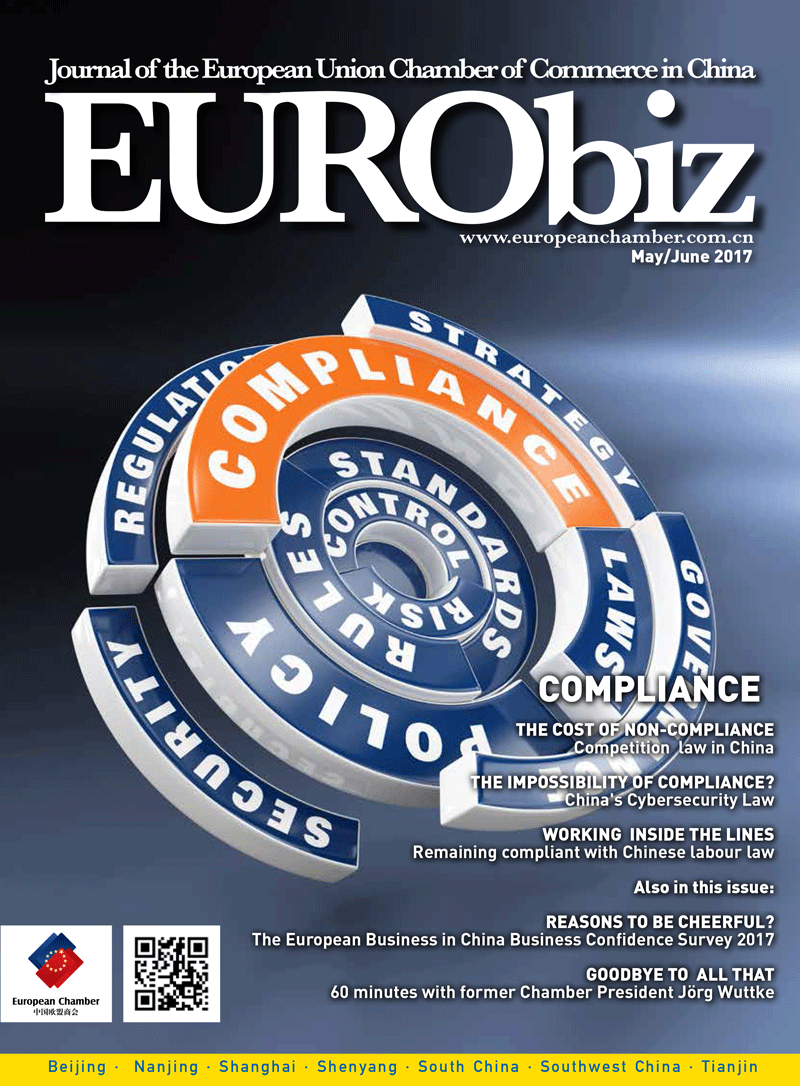 The European Chamber has long been established as an influential institution that makes a real difference in improving the business climate for European companies in China. I was therefore honoured and humbled when the members of the Chamber elected me as the new president on 12th May, at our Annual General Meeting. I am relishing the challenge of building on the solid foundation that I have inherited, and I would like to extend my sincere gratitude to Jörg Wuttke, the rest of the Executive Committee and other board members who are stepping down this year, for leaving the Chamber in such fantastic shape. I am extremely fortunate to have the support of a strong team in the newly elected Executive Committee and local boards, as well as our extremely capable secretariat, to help me continue the good work.
The European Chamber has long been established as an influential institution that makes a real difference in improving the business climate for European companies in China. I was therefore honoured and humbled when the members of the Chamber elected me as the new president on 12th May, at our Annual General Meeting. I am relishing the challenge of building on the solid foundation that I have inherited, and I would like to extend my sincere gratitude to Jörg Wuttke, the rest of the Executive Committee and other board members who are stepping down this year, for leaving the Chamber in such fantastic shape. I am extremely fortunate to have the support of a strong team in the newly elected Executive Committee and local boards, as well as our extremely capable secretariat, to help me continue the good work.
My motivation for taking on this responsibility is the belief that we have a unique window of opportunity in the coming years to influence policy even more. China has pledged to enable market forces to play the decisive role in resource allocation – its fulfilment of this promise is now essential for the creation of sustainable economic growth. However, this can only happen if there are common rules and regulations in place which are equally applied to all market participants.
This fits well with the theme of this issue of EURObiz. The requirement to comply with rules and regulations is one of the core components for establishing a level playing field for business. In efficient markets, competition is based on the innovativeness of products and services, price and reputations. In weak markets, where cheating, bribery and other illegal actions are tolerated, weaker companies and products succeed, which results in less prosperity overall.
When President Xi Jinping took office in 2012, he vowed to crack down on corruption, an endemic problem in China that is widely recognised as having put long-term sustainable economic development at risk. Since then, the number of investigations has continued to increase at an unprecedented rate, particularly with respect to corruption within the Communist Party and government. President Xi reiterated his commitment to stamp out corruption in his speech at the Chinese Communist Party’s 95th Anniversary Conference in Beijing on 1st July, 2016.
As a result, the importance of compliance programmes has increased for business in China, whether multinational, local-private or state-owned. It has rightly caused companies to look more closely at their own internal compliance procedures and has facilitated the acceptance of compliance protocols by third parties.
While the European Chamber welcomes these developments as a positive step in China’s reform process, much uncertainty and inconsistency remains in both the enforcement of laws and the focus of the government’s efforts. Business leaders must therefore not only maintain high standards, but also continue to improve compliance systems in order to protect their respective companies and demonstrate their best efforts to the regulators. While ultimately concrete actions are required, the Chamber is at least encouraged by the clear statement included in Notice of the State Council on Several Measures on Promoting Further Openness and Active Utilisation of Foreign Investment (Guofa (2017) No. 5) that “Regions and departments at all levels shall strictly implement national policy and regulations so as to maintain consistency in implementation.”
If fully enforced, this will further contribute to the establishment of a consistent and transparent anti-bribery enforcement mechanism in China, as well as creating a better environment in which to develop and implement compliance efforts. The Chamber will continue to engage with the authorities to ensure that this aspiration becomes a reality. Regardless, analysing the government’s agenda and the risk of investigations to the sector one operates in, as well as preparing company protocols on how to handle investigations, should be on the ‘to do’ lists of all European enterprises operating in China.
Compliance should never be viewed as a necessary burden or the price of doing business. Drawing on our extensive experience in international markets to lead on best practices in China presents European business with an invaluable opportunity to highlight its enduring value to the authorities, employees and customers. Fostering a business culture of ethics and integrity should therefore always be at the core of how we operate in China. Not just because it is the right thing to do, but also for our bottom lines and future growth. This special issue of EURObiz presents some of the latest thinking on how we can continue to excel at doing so.


Recent Comments